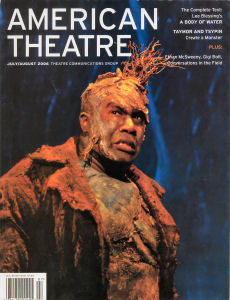AMERICAN THEATRE: The Non-profit Theatre Scene

A recent issue provides a fascinating guide to the awesome diversity of theatrical experience away from Broadway musicals and their ubiquitous touring companies.
The cover article in the issue is about the staging of Grendel, a new opera by Elliot Goldenthal based on John Gardner's celebrated 1971 novel of the same name, a reinterpretation of the old Beowulf saga from the monster's point of view. Juliet Taymor (of Lion King, Titus and Frida fame) directed a cast of 18 soloists, 48 adult chorus members, 10 child chorus singers, 20 dancers and two dozen puppets. The opera was presented this year at the Los Angeles Opera and at New York's Lincoln Center.
This Grendel is a thinking monster's monster, musing that humanity desperately needs a totally evil enemy to provide it with a sense of community and morality. He's also practical, realizing that if he kills all the men, women and children, he'd have absolutely nothing left to do.
The main setting for Grendel is what designer George Tsypin calls "a cosmic rock floating in the void." It's a rocky shelf, 48 feet wide, 24 feet deep and 9 feet high, that rotates on stage from an ice side to an earth side. The rock is powered by 26 separate motors. American Theatre describes the chaotic and tension-filled last days before the premiere in Los Angeles as the opera's creators struggle with the balky set and other problems, including the tendency for performers to fall off as it rotated.
The magazine is full of interesting tidbits, such as DePaul University's new Wigs and Hair Chicago, where you can get some sort of degree in designing, creating and maintaining stage hair, and an exhibition of playwright Clifford Odets' expressionist paintings.
I loved an article about "standardized patients," actors who are paid by the hour to simulate patients and their family members for medical students. A pediatrics resident recalled her training: "The best standardized patient encounter I had was one where we had to tell the patient's wife her husband had Alzheimer's. She started to cry―she wasn't ready to accept that fact. I had to get her to bring him in to start treatment. It was very real."
For me, the high point of the issue was a report of a gathering of theatre professionals to discuss the issues that concern them. Chief among them is competition for attention from a resurgent Broadway touring system, the Internet and mass market sports. The level of local theatre reporting and criticism in newspapers is very low, and the financially pressed newspapers are cutting back on local coverage even more these days.
Panel members reported that audience members were growing increasingly intolerant of works that questioned their values. They noted the "tyranny of the known title," the tendency of people to be drawn to a familiar name, whether the title of the play or a name actor. They also spoke of the plight of the struggling actor, writer or other artists involved in non-profit theatre, poorly paid and without health insurance. One commented, "It's great to be an artist in America when you're young. But nobody wants to take responsibility for artists when they grow up."
But the panel's comments were not all negative. They reported on innovative ways of raising funds for new productions, such as approaching corporate types with a sales pitch for "research and development" in a theatre, language that makes sense to the potential donor. And they spoke of "concierge theatre," involving the audience member in non-passive discussions and activities before the event, after the event and even during the event. Some added that many young people are turned off by the concept of a traditional theatre, but will throng a bar for theatre in the guise of a cabaret show.
A subscription to American Theatre (10 issues a year) is included in the annual membership fee of $39.95 ($20.00 for students) from the publisher. We'll send you a sample copy for $2.59.


0 Comments:
Post a Comment
<< Home